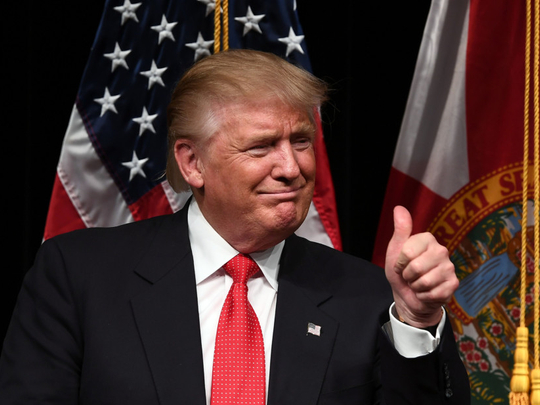
On Monday, the Republican candidate for president of the United States, Donald Trump, declared: “We defend Japan, we defend Germany, we defend South Korea, we defend Saudi Arabia, we defend countries. They do not pay us. But they should be paying us, because we are providing tremendous service and we’re losing a fortune. That’s why we’re losing — we’re losing — we lose on everything.”
This remarkably flawed reasoning is a favourite Trump theme, which passes for America’s national security strategy, though a more elaborate plan revolves around his simple idea to “take the oil” in Iraq and, presumably, elsewhere. It would be difficult for President Trump to take out Samsung in Seoul or Mercedes-Benz in Stuttgart, but somehow Arab oil is fair game.
Naturally, one may simply dismiss this as another of Trump’s thoughtless positions in what is turning out to be an encyclopedia of insignificance, though it should not be.
On September 7, Trump suggested that Iraqi oil was or should have been seized as a way to pay for the Iraq War because, he clarified: “We spend $3 trillion (Dh11 trillion), we lose thousands and thousands of lives, and then ... what happens is we get nothing. You know, it used to be to the victor belong the spoils.” Of course, this was not the first time he elaborated on the plan. He had told the Wall Street Journal in 2011 that his policy for Iraq would simply be to “take the oil ... I would not leave Iraq and let Iran take the oil”. Amazingly, he did not believe that doing so would be an act of thievery, oblivious to the legal hurdles that stand in front of what was, once upon a time, identified as the “spoils-of-war” concept.
Trump is not aware that plunder-based imperialism is now illegal under the laws of war, which the unqualified candidate dismisses and, even worse, is not even concerned that such seizures would constitute war crimes.
Speaking to the London Guardian a few days ago, Jay Hakes, the author of A Declaration of Energy Independence, said that the idea was stupid, adding that “seizing Iraq’s oil would make our current allies ... our new enemies. We would likely, at the least, have to return to the massive military expenditures and deployment of American troops at the war’s peak”.
Gaining full control
Of course, Trump wore this ugly imperialism on his sleeves and though he repeatedly couched his remarks in terms of a desire to deny Iraqi oil to Daesh (the self-proclaimed Islamic State of Iraq and the Levant), in reality, what he planned to do was to seize the bulk of the country’s oil fields. For the record, these are located mostly in the south, near the Arabian Gulf. What Trump is not saying is that his vision entails gaining full control over one of the largest oil reserves in the world. Even if this was a doable proposition — perhaps with the permanent presence of thousands of occupation troops — and even if legal hurdles were settled, it remains an abominable proposition.
Far more qualified imperialists floated similar ideas in the recent past only to abandon them because wiser leaders objected to senseless adventurisms.
A frustrated Henry Kissinger, former US secretary of state, for example, daydreamed about seizing the oil fields of the Arabian Peninsula as a way to distance Washington from the consequences of petro-dollar economics in the early 1970s. Kissinger was famous for his double and triple negatives in spoken and written missives, though he never ruled out the use of force to secure lower oil prices. He negotiated with Saudi leaders, but shamefully, kept a Damocles Sword hanging over their heads.
In a January 1975 interview with Business Week magazine, Kissinger explained his logic — as to why no military action was taken to contain rapidly-growing oil prices — when he declared: “It is easier to get into a war than to get out of it. I am not saying that there’s no circumstance where we would not use force. But it is one thing to use it in the case of a dispute over price, it’s another where there’s some actual strangulation of the industrialised world.”
In his pseudo-imperialist vision, Trump is not alluding to a drastic cutback or an embargo of oil supplies to control Iraq’s oil, but to his thievery talents. What he fails to appreciate is that oil-producing states are American allies. Although the US routinely produces deranged demagogues, the time is long overdue to end these catastrophic appearances and their negligent visions. The time has come to adopt mutually-assured interest planks instead — for everyone’s sake.
Dr Joseph A. Kechichian is the author of the just-published From Alliance to Union: Challenges Facing Gulf Cooperation Council States in the Twenty-First Century (Sussex: 2016).











